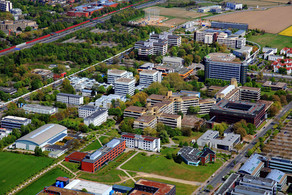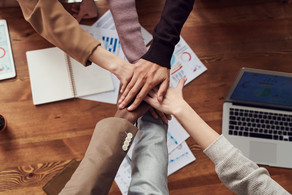"The TU Dortmund should set an example".
- TU News
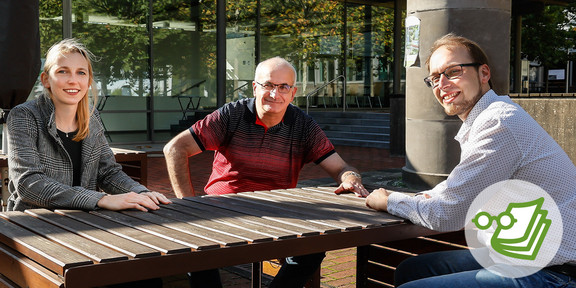
Scientists for Future (S4F) is a supra-regional, non-partisan association of scientists from a wide range of disciplines working to raise awareness about the global climate, biodiversity and sustainability crises. The goal is to strengthen the scientifically based exchange in the social debate about sustainability and climate change.
Two members of the Dortmund regional group of S4F met with Rector Prof. Manfred Bayer on the occasion of the opening of the Sustainability Office at TU Dortmund University to talk about a sustainable university in the face of climate change. The interview was conducted by physicist Dr. Robert Temminghoff and computer scientist Luise Weickhmann.
Mr. Bayer, how important is sustainability for you? Both for me personally and at TU Dortmund University, sustainability has a high priority. This is one of the reasons why the rectorate and the senate adopted a sustainability strategy in May 2021, which will be used to bring the topic to all levels of the TU Dortmund University. It is important to me to combine different forms of sustainability.
We also speak of sustainability as social, society-related responsibility for good reason - although protecting the environment remains central. Individual social activities have been slowed down by the Corona pandemic; we will take them up again more strongly later.
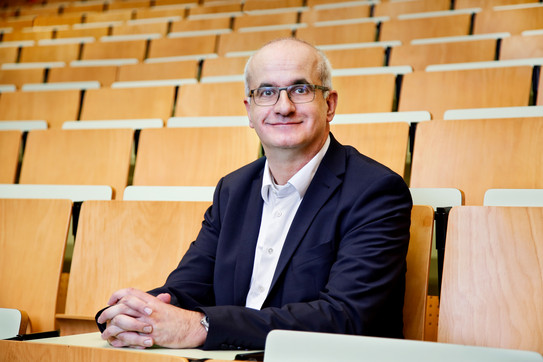
Joint planting campaigns, for example, will be taken up again at a later date. Another important topic in environmental protection is currently offsettingCO2 emissions from business trips. This is still difficult, because as a university we are bound by the principle of economic efficiency. At least it is now possible to claim compensation through third-party funding.
By consuming theCO2 budget, future generations are implicitly restricted. How can TU Dortmund help to achieve the Paris climate goals? Certainly, we are rather a small player compared to certain economic sectors. Nevertheless, I see many possible contributions on the part of the university: first of all, we educate people and, as part of this education, we should also create awareness for the issues mentioned.
It may not make sense in every individual case to integrate such issues into teaching programs - think of lectures on quantum mechanics, for example. But this can be realized, for example, through the Studium Generale or cross-faculty events, even in the minor; here, the range of courses can be expanded.
There are already external online courses that would be suitable for this. Do you see the possibility of students being able to take such courses for credit in the future? I would have nothing against this in principle. However, there have been and still are corresponding events on the part of the TU Dortmund University. In the winter semester 2020/21, for example, I opened the lecture series "Climate: Change, Values, Science" - a very popular event. Several lectures by Scientists for Future were integrated into the lecture. Also new in the winter semester 2021/22 is a thematically relevant certificate program, the "Studium Oecologicum," which gives TU Dortmund students an opportunity to develop their personal skills in the area of sustainability.
Thinking beyond teaching - what else is TU Dortmund University doing for sustainability and climate protection? Several scientific disciplines at the TU Dortmund work directly on issues relevant to sustainability. Examples include electrical engineering, with its focus on electromobility and the energy transition, or the topic of sustainable construction in civil engineering.
Science communication is important. I believe that we at TU Dortmund University have a particular responsibility here, because we are one of the few universities that also train journalists.
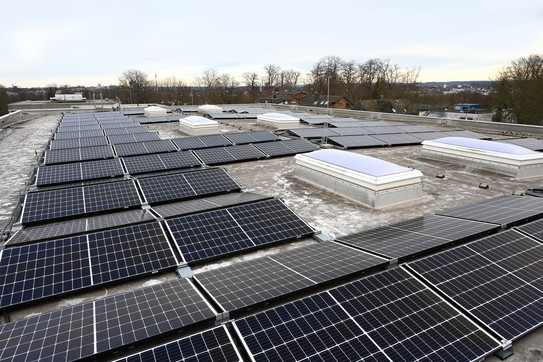
And in concrete projects, we should be a good role model ourselves, even in the supposedly small things. Reducing paper consumption or switching to environmentally friendly paper, for example, makes a big difference. We have achieved a lot in this respect with the electronic submission of final papers.
Nevertheless, we suffer from the fact that various old buildings belong to the TU Dortmund, but they are not owned by the university, but by the Bau- und Liegenschaftsbetrieb NRW. That's why, for example, we can't install photovoltaic systems on every roof without further ado. However, in December 2020, for example, a new system went into operation on the roof of the experimental hall of the Institute of Machining Technology at the South Campus.
So would you say that the country has to follow suit so that you, as the university's representative, can really change something here? In many respects, yes, we are already in dialogue about this. But we are still committed to building as economically as possible. The fact that these regulations partly exclude sustainability measures is unfortunate in that after the construction costs, of course, the operating costs of buildings over several decades have to be considered; here, costs are often amortized by environmentally favorable measures.
Irrespective of the economic aspect, it would certainly be interesting for a university to implement projects with a model character and thus show what is possible. Absolutely, there have been and still are projects by Dortmund's civil engineers, for example, who are researching ecological and sustainable building materials. But we can also do a lot on campus. Following discussions with the AStA, urban gardening projects or insect and bird walls are being considered. We are also open to ideas from students.
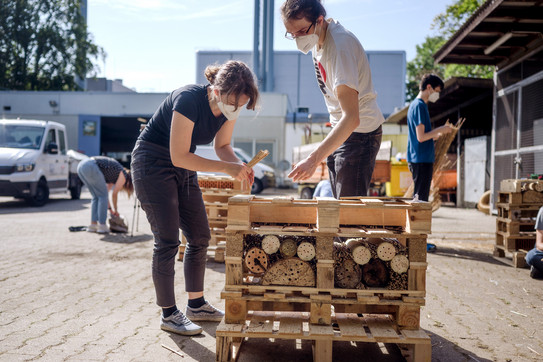
What direct contact have you had with projects that want to implement sustainability at TU Dortmund, and to what extent does the topic concern you in your everyday life?
In my private everyday life, I try to behave sustainably. For example, I don't have a car and take the train on vacation. I have often been involved in clean-up campaigns in parks, for example. In March 2020, the physics faculty planted trees in Rombergpark together with Scientists for Future - so there are very different individual actions.
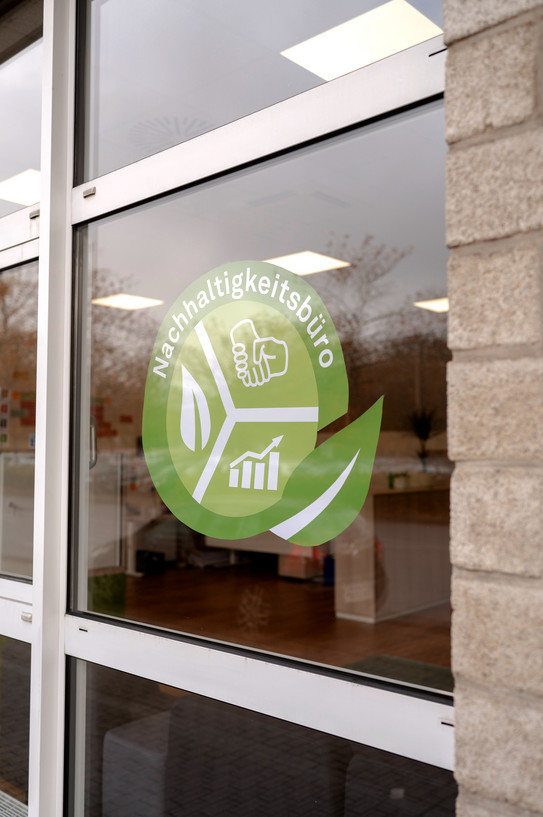
Are more actions of this kind planned in the future? We would like to repeat the tree planting as soon as it is possible. There are quite a few small actions of this kind. What was missing until now was a place to coordinate activities and collect information. That is why we have now set up a sustainability office, coordinated by Bastian Stahlbuck and headed by Henning Moldenhauer. Ideas for actions and approaches are collected there.
At the same time, it helps to reach the right contact persons and also provides support in organizing human and financial resources. With the sustainability office, we have also created spaces where interested parties can meet - even on weekends or in the evenings - and get something going together. In addition, various foundations support sustainability projects and provide funds - here, too, the sustainability office can help.
You've already mentioned how important collaboration is when it comes to sustainability. Where do you see opportunities for interaction between the TU Dortmund and the city?
We are part of the city, so it is often a matter of working together. The TU Dortmund University of Technology is involved in the energy transition control centre Dortmund, for example - after all, experts from these fields are conducting research here. Among other things, we are also involved in the "Smart City Dortmund" as part of the Energy Transition Master Plan. Renewable energy sources are also a topic here.
As TU Dortmund University, we are part of a larger whole and should set an example - in terms of expertise, helpfulness, know-how and communication, but also with concrete example projects such as the combined heat and power plant on campus, which achieves an efficiency of 90 percent and is thus particularly resource-saving.
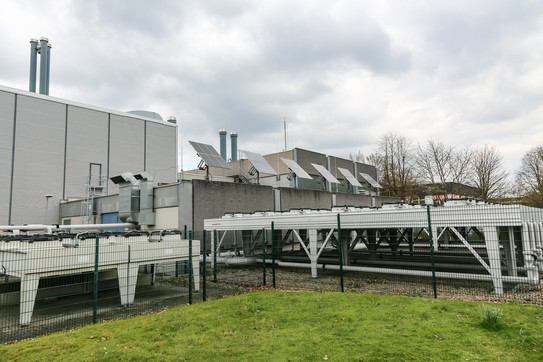
What other ways are there to save energy on campus? For example, laboratories could be located in basements where they are not exposed to extreme heat loads. We have very energy-intensive research facilities that need to be operated. Here, the goal should be to use 'green' power when economically feasible. We have also explicitly committed to switching to green power by 2025, as well as to consistent energy-saving measures.
For students, it would be nice if they could also study or work outside. What do you think of the idea? We've thought about that, too. For example, you could generate zones with lecture halls in the green. Such projects cost money, but why not?
One conclusion of our conversation could be: there are many steps and ideas that go in the right direction. The question remains, are we going fast enough? That's right. There is a time pressure to act. But it is also important to me to involve as many members of TU Dortmund as possible. Only then will we achieve the necessary speed in the longer term. Here, too, the new sustainability office will support the goals of the TU Dortmund.
Can you imagine that the TU Dortmund could still become climate-neutral during your term of office? It would be nice. Promises are difficult, but we should continue on the path consistently and work on it every day. I would say: roll up your sleeves and get started.
Collaboration: Henning Moldenhauer
This is an article from mundo, the research magazine of TU Dortmund University.
All articles of the current issue

